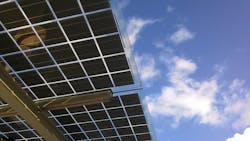More energy efficiency programs are encouraging zero-energy projects
By Peter Fabris, Contributing Editor
At least 20 energy efficiency programs in the U.S. and Canada are focusing on encouraging and assisting building projects to be built to zero-energy and zero-energy-ready standards.
According to the American Council for an Energy Efficient Economy (ACEEE), these programs have an annual budget of about $65 million. They have collectively completed nearly 200 single-family homes, about 900 apartments in multifamily buildings, and 74 commercial totaling more than two million square feet of floor area. Affordable housing accounts for a significant portion of the multifamily projects.
A zero-energy building produces an amount of onsite energy (typically from photovoltaic panels) that equals or exceeds the energy it buys from utilities plus the energy losses from generation and transmission over the course of a year. Zero-energy-ready buildings are typically efficient enough to be operated with onsite energy, but lacking the solar energy systems needed to make the building truly zero-energy.
A few programs promote zero-carbon buildings, which emit no net carbon over the course of a year. Zero-energy homes and buildings often cost a little more to build than conventional homes and buildings, but as experience is gained, costs are going down, ACEEE says.
